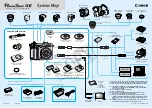
57
3
B
asic Op
er
atio
ns
“Red-eye” is the phenomenon where eyes look reddish in photographs
taken in dark environments with a flash. This is caused by the reflection of
the electronic flash in the retina of the eye. Red-eye occurs because pupils
are dilated in dark environments.
This phenomenon cannot be averted but the following measures can be
used to combat it.
• Brighten the surroundings when shooting.
• Set to wide angle and shoot from closer if a zoom lens is in use.
• Use a flash that supports red-eye reduction.
• Position the flash as far away from the camera as possible when using
an external flash.
The red-eye reduction function on this camera reduces red-eye by
discharging the flash twice. With the red-eye reduction function, the
pre-flash is discharged just before the shutter is released. This reduces
pupil dilation. The main flash is then discharged while the pupils are
smaller, reducing the red-eye effect. To use the red-eye reduction
function, set
i
(Red-eye reduction auto flash) in Picture mode or
j
(Red-eye reduction manual flash) in other modes for Flash mode.
In daylight conditions, the flash will eliminate shadows when a portrait
picture is taken with a person’s face cast in shadow. Use of the flash in this
way is called Daylight-Sync Shooting. Flash is discharged manually when
shooting with Daylight-Sync Shooting.
Taking pictures (Auto Picture)
1 Confirm that the flash has popped up and the flash mode is set to
h
(Manual discharge). (p.56)
2 Confirm that the flash is fully charged.
3 Take the picture.
Using Red-eye Reduction Flash
Daylight-Sync Shooting
The picture may be overexposed if the background is too bright.
Without Daylight-Sync
With Daylight-Sync
Summary of Contents for K 100D Super
Page 12: ...Memo 10 ...
Page 42: ...Memo 40 ...
Page 98: ...Memo 96 ...
Page 114: ...Memo 112 ...
Page 217: ...Memo ...
Page 218: ...Memo ...
Page 219: ...Memo ...












































